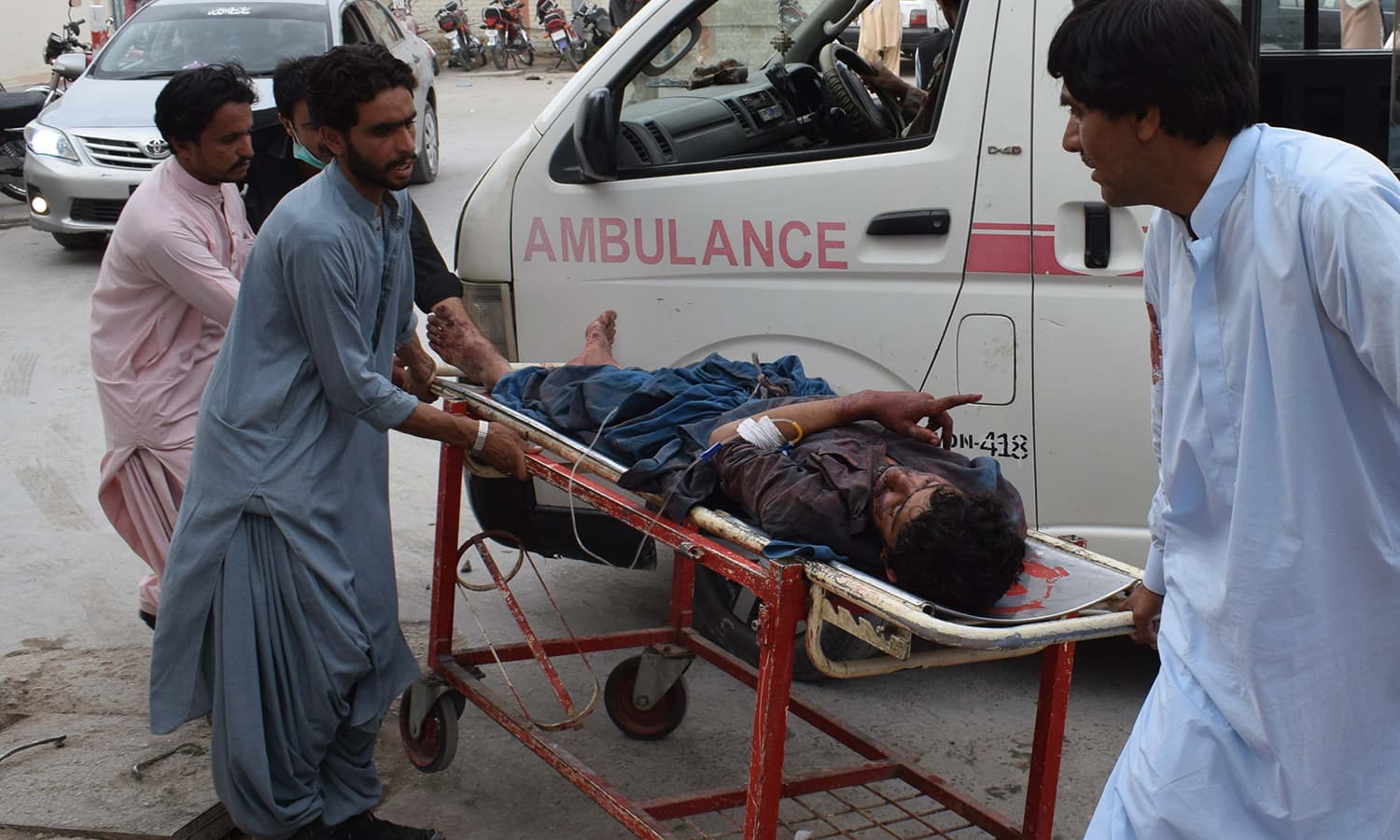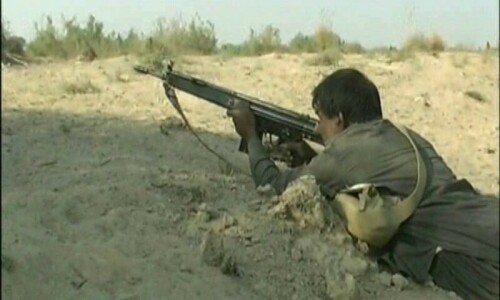Mastung bombing: 128 dead, over 200 injured in deadliest attack since APS, IS claims responsibility







At least 128 people, including politician Nawabzada Siraj Raisani, were killed and more than 200 injured in a deadly suicide blast in Balochistan's Mastung district on Friday afternoon, Balochistan Home Minister Agha Umar Bangulzai told DawnNewsTV late evening.
The militant Islamic State claimed responsibility for the attack through its Amaq news agency. The attack is the deadliest since the 2014 carnage at Peshawar's Army Public School.
"Mir Siraj Raisani succumbed to his wounds while he was being shifted to Quetta," Bangulzai had told AFP earlier.
Balochistan's Civil Defence Director Aslam Tareen, as well as Bangulzai, had both confirmed earlier that the blast was the result of a suicide attack.
Provincial officials said an unidentified attacker had targeted a corner meeting organised by Siraj, a Balochistan Awami Party (BAP) candidate for PB-35 (Mastung). Senior provincial official Saeed Jamali said the bomber detonated his explosives in the middle of the compound where the political meeting was taking place.
Senior Vice-President of BAP Sarfaraz Bugti condoled Nawabzada Siraj's death.
Die-hard Pakistani and true patriot! RIP Siraj brother #MastungBlast pic.twitter.com/zv7dEYI7hg
— Sarfraz Bugti (@PakSarfrazbugti) July 13, 2018
The army chief also issued a statement condemning the attack.
COAS condemns heinous terrorist attk in Mashtung. Grieved on loss of precious lives. Pak lost a highly devoted & capable politician Siraj Raisani. Attempts of inimical forces to derail important democratic activity shall not succeed. United we all Pakistanis shall IA defeat them.
— Maj Gen Asif Ghafoor (@OfficialDGISPR) July 13, 2018
It is pertinent to mention here that the spy chiefs of Russia, Iran, China and Pakistan had reportedly met on Tuesday in Islamabad over the growing threat to the region from the militant Islamic State in Afghanistan.
The Foreign Office had denied knowledge of the meeting, but officials had privately confirmed to Dawn that the meeting took place.
Read more: FO says not aware of quadrilateral meeting of spy chiefs
Nawabzada Siraj Raisani
The younger brother of former Balochistan chief minister Nawab Aslam Raisani, Nawabzada Siraj had been chief of the Balochistan Muttahida Mahaz (BMM), formed by Nawab Ghous Bakhsh Raisani in the 1970s, till June this year.
He had recently merged BMM with the newly-formed BAP.
He was contesting PB-35 (Mastung) for the 2018 elections against his own brother, Nawab Aslam Raisani, who is contesting as an independent.
Siraj's teenage son, Hakmal Raisani, had been killed in a grenade attack on his vehicle in the same district in 2011. Siraj, who had been present inside the vehicle at the time of the attack, had escaped unhurt.
Shrugging off the threat to his own life, he had said at the time that he would continue to "raise the slogan of Pakistan".
Election violence
The Mastung bombing was the latest — and deadliest — of a string of attacks targeting politically active persons ahead of the July 25 election.
Earlier today, a blast targeted former Khyber Pakhtunkhwa chief minister Akram Khan Durrani's convoy in Bannu. While Durrani remained safe, four people were killed and 32 others injured in the attack.
Last night, two people had been injured in a blast near BAP's election office in Khuzdar.
On July 10, a suicide blast had killed Awami National Party (ANP) leader Haroon Bilour and 19 others in Peshawar's Yaktoot area. The attack was claimed by the Tehreek-i-Taliban Pakistan (TTP) which had also claimed responsibility for 2012 attack that killed Haroon's father, Bashir Bilour.
On July 7, at least seven people, including a candidate of Muttahida Majlis-i-Amal (MMA), were injured when a convoy came under a bomb attack in Bannu.
Earlier this month, an attack on a Pakistan Tehreek-i-Insaf (PTI) candidate's office in North Waziristan's Razmak tehsil had injured 10.
Following the attacks, activists called for authorities to remain vigilant to protect candidates during the final days of the campaign season.
"The Pakistani authorities have a duty to protect the rights of all Pakistanis during this election period ─ their physical security and their ability to express their political views freely, regardless of which party they belong to," said Omar Waraich, deputy South Asia director at Amnesty International.
The Election Commission of Pakistan has also sought a detailed briefing from the National Counterterrorism Authority (Nacta) on the threats faced by politicians and candidates.
Deadly district
Situated at a distance of 54km southeast of Quetta, Mastung has been a frequent site of deadly bombings targeting civilians.
In May 2017, 28 people were killed and over 40 others injured in an explosion near a local seminary in Mastung, which targeted the convoy of then deputy chairman Senate Abdul Ghafoor Haideri.
In 2014, more than two dozen people were killed and several injured when a powerful explosion ripped through a bus carrying Shia pilgrims.
In 2012, 19 people were killed and 25 others injured after three passenger buses were struck by an explosion in Mastung's Dringarh area. A remotely-triggered bomb had hit a convoy of three buses and set one of them ablaze.
Additional reporting by Ismail Sasoli.















































